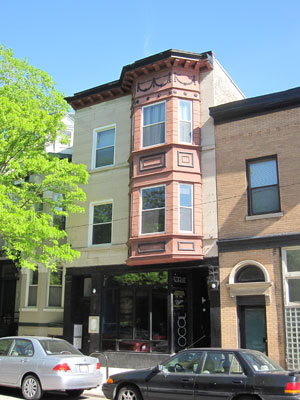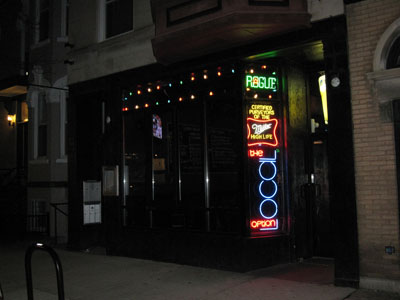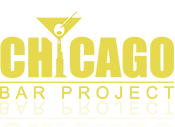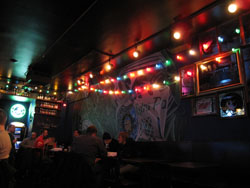 Deep in the heart of the Sheffield Neighbors is an intriguing bar known as the Local Option. Although almost unknown to many North Siders, the Option is a popular hangout for local residents and the DePaul crowd. Even fewer realize that the Local Option is one of the last traditional Chicago neighborhood taverns, has a rotating selection of intriguing craft brews rarely found elsewhere, and was the first to sell Rolling Rock in the city. The Local Option takes its name after an attempt to prevent its opening by voting the neighborhood dry, though today’s local option is to enjoy only the beer selection with or without sampling their excellent selection of Cajun food, the likes of which even gives Heaven on Seven a run for their money. Put that in your pipe and smoke it, mmm-hmm.
Deep in the heart of the Sheffield Neighbors is an intriguing bar known as the Local Option. Although almost unknown to many North Siders, the Option is a popular hangout for local residents and the DePaul crowd. Even fewer realize that the Local Option is one of the last traditional Chicago neighborhood taverns, has a rotating selection of intriguing craft brews rarely found elsewhere, and was the first to sell Rolling Rock in the city. The Local Option takes its name after an attempt to prevent its opening by voting the neighborhood dry, though today’s local option is to enjoy only the beer selection with or without sampling their excellent selection of Cajun food, the likes of which even gives Heaven on Seven a run for their money. Put that in your pipe and smoke it, mmm-hmm.
Nestled firmly into the block, the Local Option is found at the base of a nondescript three-flat on the north side of Webster Avenue, just west of Seminary. Blue and orange neon illuminates “The Local Option,” next to an “Official Purveyor of the Miller High Life” neon sign. You’ll only need to have your ID ready on the weekends as you step through the red chili-peppered door. Inside the Option, you’ll find a long narrow room with a worn wooden floor, an old wooden bar with blue beveled back-lighting that runs along the east wall, and a couple of low-slung wooden tables in the front window. A chalkboard hangs on the wall to the left of the bar, illustrating a selection of 25 draft beers that includes Miller High Life as well as 25 microbrews and imports that are likely to be new to even the most seasoned beer enthusiasts. On my last visit, we had a Hitachino White (Japan), Maredsous, Three Floyds Dread Naught, Phin and Matt’s, and a Yellow Snow Ale – your mother told you never to eat it, but you now can drink it! Delirium Tremens is also dispensed under a rather impressive pink elephant, the first of several you are likely to see after drinking that potent brew… Combined with their bottle selection that more than doubles the total number of ales on offer, the Local Option now rivals other legendary Chicago beer bars like Hopleaf, Quenchers and Map Room.
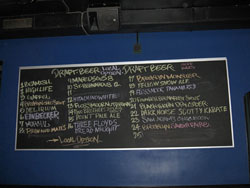 Rolling Rock, first featured in Chicago at the Local Option by former owner Hugh Haller, is no longer featured on tap but you can enjoy one in the bottle as you gaze at the giant Rolling Rock mural painted upon the eastern wall in the front room. Haller convinced the Pennsylvanian brewery that there was a market for a beer here in Chicago. Prior to that, Rolling Rock was nowhere to be found in the city. Thanks to Hugh’s tenacity and Cincinnati roots, Rolling Rock is now served at the majority of bars in Chicago and the company even sponsors the Sheffield Garden Walk.
Rolling Rock, first featured in Chicago at the Local Option by former owner Hugh Haller, is no longer featured on tap but you can enjoy one in the bottle as you gaze at the giant Rolling Rock mural painted upon the eastern wall in the front room. Haller convinced the Pennsylvanian brewery that there was a market for a beer here in Chicago. Prior to that, Rolling Rock was nowhere to be found in the city. Thanks to Hugh’s tenacity and Cincinnati roots, Rolling Rock is now served at the majority of bars in Chicago and the company even sponsors the Sheffield Garden Walk.
No room at the bar? Pull up a stool at one of the cocktail tables across from it. When the conversation dries up and if there’s nothing on one of the plasma televisions, have a crack at the Golden Tee along the north wall, before you hit the hallway that leads back to restrooms accessible through the east wall, before a series of old photos of Lincoln Park. Those that knew the Local Option before the current ownership took over, will miss the shufflepuck bowling, Rolling Rock bicycle hanging from the ceiling, red-felted pool table, wooden Indian, the pug named “Knuckles,” and Mars Attacks! pinball machine.
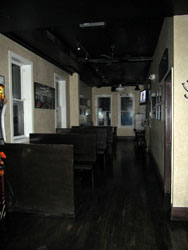 The back room features a couple of booths across from a kitchen that has replaced the small wooden oyster bar where patrons used to shuck away. Here, you are sure to enjoy a sampling of food that’s hard to find outside of New Orleans: po’ boys, Creole coleslaw, seafood gumbo blackened tilapia, clams, blackened chicken, spicy corn and crab soup, muffaletta sandwiches, and chicken and andouille jambalaya all of which is served in plastic baskets. You’ll also find chicken wings, beer battered fries, fish tacos served with grilled swordfish, and bourbon bread pudding for dessert. The average entrée will set you back $8 to $20. Lunch and weekend brunch are also served, the latter featuring crab cakes with poached eggs, banana and pecan pancakes, salmon-topped bagels, and egg, potato and andouille hash. Carry-out is also available. While the food is often lauded, the service can be hit-or-miss, so have patience (and another beer). Additional seating can be found in the outdoor patio in warmer times.
The back room features a couple of booths across from a kitchen that has replaced the small wooden oyster bar where patrons used to shuck away. Here, you are sure to enjoy a sampling of food that’s hard to find outside of New Orleans: po’ boys, Creole coleslaw, seafood gumbo blackened tilapia, clams, blackened chicken, spicy corn and crab soup, muffaletta sandwiches, and chicken and andouille jambalaya all of which is served in plastic baskets. You’ll also find chicken wings, beer battered fries, fish tacos served with grilled swordfish, and bourbon bread pudding for dessert. The average entrée will set you back $8 to $20. Lunch and weekend brunch are also served, the latter featuring crab cakes with poached eggs, banana and pecan pancakes, salmon-topped bagels, and egg, potato and andouille hash. Carry-out is also available. While the food is often lauded, the service can be hit-or-miss, so have patience (and another beer). Additional seating can be found in the outdoor patio in warmer times.
Local Option patrons primarily consist of neighborhood denizens ranging in age from 21 to 60. One would imagine that the bar would attract more DePaul students, as the university is only a few blocks away, but they seem to gravitate towards livelier establishments like McGee’s, John Barleycorn’s Memorial Pub or The Apartment. Instead, you’ll probably find more professors than students on any given night (at least during the week), and it can be the ideal setting for brunch when your parents come to visit you on Sunday afternoon. Overall, the crowd at the Local Option is pretty laid back and, “a measure of calm beyond the Lincoln Park frenzy,” according to Citysearch: Chicago. You can be sure that no one is here to ”see and be seen.”
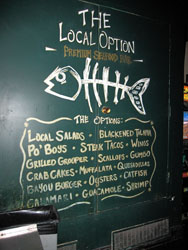 All this is quite a refreshing change from when the bar used be, “the Chessman Bar, a rough biker joint also known as Fred & Tiny’s for more than 17 years,” according to Dave Carmody in Barfly’s Guide to Chicago’s Drinking Establishments (2000). In 1986, Hugh Haller and five silent partners purchased the bar and were in the process of renovating it when some neighborhood residents, who rued the day the Chessman opened, attempted to exercise their “local option.” This term refers to a Chicago ordinance that allows neighborhoods to keep their precincts dry. To counter this threat to their business, the owners had to go door to door to reverse public opinion and prevent the issue from getting on the ballot for a general vote, which was difficult as many residents were told that the new bar would be an LGBTQ+ friendly punk rock club with a 1,000 square foot outdoor deck. In a last ditch attempt, one of the neighbors attempted to bribe Hugh with $1,000 or $1 per fictional LGBTQ+ friendly-punk-patio square foot of space. Obviously, these unneighborly tactics didn’t work and the bar found a name to commemorate the experience.
All this is quite a refreshing change from when the bar used be, “the Chessman Bar, a rough biker joint also known as Fred & Tiny’s for more than 17 years,” according to Dave Carmody in Barfly’s Guide to Chicago’s Drinking Establishments (2000). In 1986, Hugh Haller and five silent partners purchased the bar and were in the process of renovating it when some neighborhood residents, who rued the day the Chessman opened, attempted to exercise their “local option.” This term refers to a Chicago ordinance that allows neighborhoods to keep their precincts dry. To counter this threat to their business, the owners had to go door to door to reverse public opinion and prevent the issue from getting on the ballot for a general vote, which was difficult as many residents were told that the new bar would be an LGBTQ+ friendly punk rock club with a 1,000 square foot outdoor deck. In a last ditch attempt, one of the neighbors attempted to bribe Hugh with $1,000 or $1 per fictional LGBTQ+ friendly-punk-patio square foot of space. Obviously, these unneighborly tactics didn’t work and the bar found a name to commemorate the experience.
“This is the last, true-blue gin mill in this neighborhood that’s managed to survive from the days when Lincoln Park was a place you wouldn’t want to leave your car.”
– Shecky’s Bar, Club & Lounge Guide 2002
With the exception of Charlie’s on Webster a few blocks west, the Local Option is the last neighborhood bar in Lincoln Park West and a damn fine place to hoist a few of the best brews you’re going to find in the city, as well as to savor a delectable sampling of New Orleans-style fare. “Whenever you walk by, you want to go in. Rest of the time you forget it’s even there.” noted The Official Chicago Bar Guide (2001) and this remains true today. While it may be destined to suffer this fate from many would-be patrons, similar to Side Street Saloon and Cody’s, don’t make the mistake of passing by. For more information, you’ll have to call as the Local Option does not have a website. Santé.
